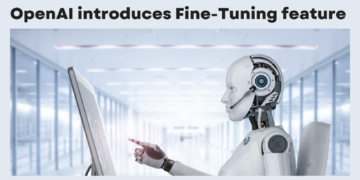Remember the Jetsons zipping around their futuristic home, with Rosie the robot (their AI personal assistant) anticipating their every need? The current hot topic among AI enthusiasts, or well, anyone who does not live under a rock, is Generative AI. The interest began when OpenAI unleashed ChatGPT onto the world and it has taken over every conversation.

This is not surprising, given the far-reaching implications, and the potential impact AI could have on every department of every industry. If you are, in fact paying attention to the trending topics these days, you might have noticed a slight shift on the focus from Generative AI to AI that can act as a personal assistant.
You might be thinking, but what’s new here? We’ve had AI personal assistants since over a decade in my iPhone and Alexa, who help me by answering questions and performing small tasks. If you think that’s all personal AI assistants can do from since over a decade, how naïve of you!
Their journey from clunky, misunderstood voice prompts to surprisingly nuanced conversationalists has been nothing short of remarkable. Buckle up as we take a trip down memory lane to witness the evolution of these digital companions, before gazing into the crystal ball of their future.
AI Personal Assistants have been the Pioneers of Digital Dialogue
In 2011, Siri’s debut on the iPhone sent shockwaves through the tech world. It was the first AI assistant to gain widespread attention, its ability to understand basic commands and engage in witty banter piquing everyone’s curiosity. Then came Alexa in 2014, revolutionizing the concept with its focus on smart home integration and voice-activated control. Suddenly, adjusting the thermostat or turning on the lights felt like magic.
However, these early birds weren’t perfect. They frequently tripped over complex inquiries, lacked context awareness, and personalization was about as likely as finding flying cars (sorry, Jetsons). Still, they laid the groundwork, and the advancements since then have been mind-blowing.
Evolution at its Finest
Natural Language Processing has undergone a metamorphosis. Today’s assistants can seamlessly parse complex sentences, even understand sarcasm and humour, making conversations feel increasingly natural. Smart home integration has exploded, transforming our homes into interconnected havens of convenience. Gone are the days of fumbling for light switches – just utter a command, and boom, illumination!
Personalization? AI assistants are becoming eerily attuned to our habits and needs. From learning your coffee preferences to anticipating your daily commute, they’re evolving into digital butlers who know us better than ourselves (almost).
The Generative AI Game Changer
The rise of generative AI is not just a technological evolution, it’s a full-blown arms race. Tech giants and startups alike are pouring resources into developing the best, most versatile AI assistants, each vying for dominance in this burgeoning market. Companies like Google, Microsoft, OpenAI, and Baidu are all investing heavily in research and development, acquiring promising AI startups, and building their own ecosystems around generative AI technology.
Beyond Hype: Real-World Applications
The potential of generative AI assistants extends far beyond just writing funny tweets or composing poems. Companies are exploring real-world applications across various industries:
- Education: Personalized learning plans, creating interactive educational content, and providing real-time feedback to students.
- Customer Service: Building chatbots that handle complex inquiries, generate personalized recommendations, and offer emotional support.
- Marketing and Advertising: Creating targeted and engaging marketing campaigns, writing unique product descriptions, and analyzing customer sentiment.
- Content Creation: Writing scripts, generating realistic images and videos, and even composing music or code.
What to Expect from AI Personal Assistants?
A Glimpse into the Future
Inculcating AI, especially AI personal assistants, into various industries beyond smart homes holds immense potential and possibilities.
Imagine:
- Healthcare: AI assistants analyzing medical data to assist doctors in diagnosis and treatment, offering personalized health advice, and even providing emotional support to patients. A recent study from MIT showed an AI assistant successfully achieving human-level performance in diagnosing skin cancer from images.
- Education: Personalized learning environments where AI adapts to each student’s strengths and weaknesses, creating targeted study materials and fostering deeper engagement. Researchers at Carnegie Mellon University developed an AI that acts as a personalized tutor, adjusting its teaching style based on student responses.
- Retail: Smart stores that use AI assistants to offer real-time product recommendations, track customer preferences, and even personalize in-store experiences. Amazon’s “Just Walk Out” stores are a prime example of AI-powered retail automation.
AI Personal Assistants & Software and IT
The role of AI personal assistants in software and IT is not just about convenience, it’s about revolutionizing the way we work.
- Integration with Software Development Tools: Imagine AI assistants suggesting code fixes, debugging complex algorithms, and even writing entire portions of code based on developer specifications. Google’s Copilot is an early example of this, offering real-time coding suggestions and even completing code snippets.
- Streamlining IT Operations and Support: AI assistants can automate routine tasks like system checks, troubleshoot network issues, and even identify potential security threats before they occur. IBM’s Watson Assistant is used by companies like AT&T for AI-powered IT support, resolving customer issues faster and more efficiently.
- Potential Impact on the Future of Software and IT Industry: AI assistants could usher in a new era of hyper-efficiency and creativity in software development. Developers will be able to focus on complex problems and strategic tasks, while AI handles the mundane and repetitive work. This could lead to faster development cycles, innovative solutions, and a more productive and fulfilling work environment for IT professionals.
By embracing the potential of AI personal assistants, the software and IT industry can leap into a future of increased productivity, enhanced creativity, and game-changing solutions.
Challenges and Opportunities
The road to AI integration is not without its bumps. Bias in training data, ethical considerations around data privacy and job displacement, and the need for robust security measures are all crucial factors to address. Yet, the potential benefits far outweigh the challenges. By ensuring responsible development and ethical implementation, AI personal assistants can become powerful tools for progress and innovation across diverse industries.
Ethical and Privacy Considerations
As AI personal assistants become more integrated into our daily lives, it’s crucial to consider the ethical and privacy implications of their widespread adoption.
Data Privacy and Security Concerns
The collection and utilization of personal data by AI assistants raise important privacy and security concerns, necessitating robust measures to safeguard user information.
Impact on Human Interaction and Social Dynamics
The increasing reliance on AI personal assistants could have profound implications for human interaction and social dynamics. Recent report suggested that youngsters haven chosen to spend hours with an AI therapist on character.ai, a website offering interactive chatbots, including bots that can imitate famous and fictional personalities. Some might interpret the choice to spend time with a therapist as a focus on well-being. But, the choice is to spend time with an online bot instead of talking to a real therapist. It highlights the need to choose an online bot over someone close to them to have a deep conversation. This surely prompts a reevaluation of the role of AI in shaping our relationships and behaviors.
Ethical Considerations in AI Personal Assistant Development
Developers and stakeholders in the AI industry must prioritize ethical considerations in the design and deployment of AI personal assistants. The amount of personal data leaking into the hands of AI and the companies deploying them is not small. So it should be a priority to ensure that these technologies align with ethical standards and societal values.




























